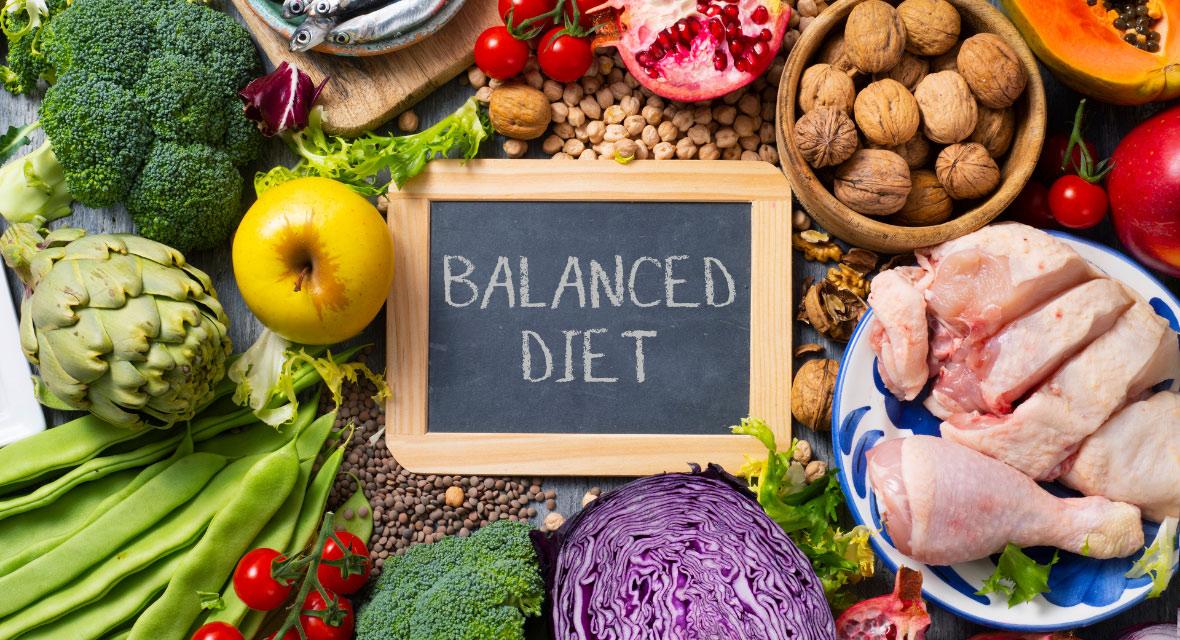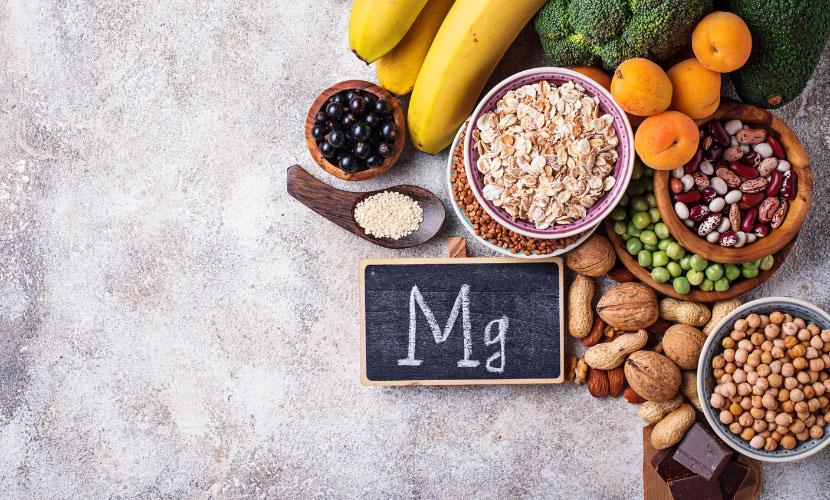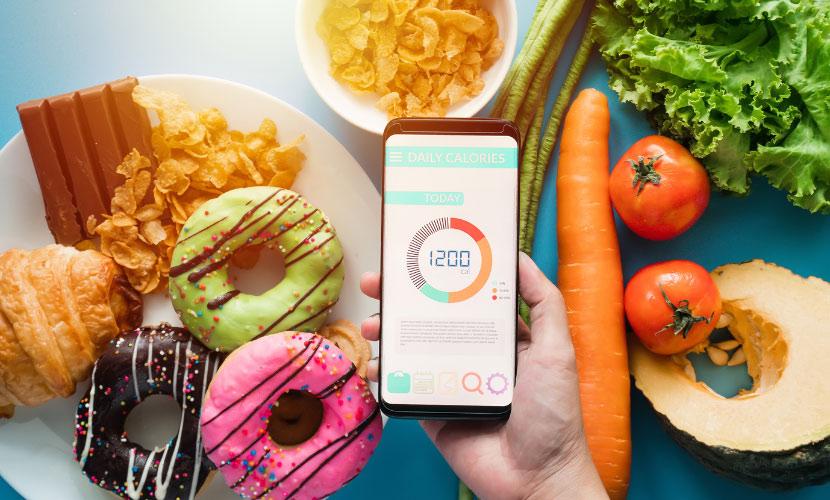🏆 As seen and loved on Shark Tank Dubai 🏆

Importance of Balanced Diet
Balanced Diet: Its Benefits & How Important It is for You
The degree to how healthy our life is heavily governed by what we eat on a daily basis. Your fitness, mental health, your mood, your immunity, and your longevity in life depend on the type of food you intake. Needless to say, keeping a watch on your diet is crucial.
In fact, what we eat in our childhood will impact not only our adolescence but also our adulthood. A healthy meal plan helps children grow and accelerates their physical and mental development. At the end of the day, we should aim for a diet that helps maintain ideal body weight while also providing immunity against chronic diseases.
And what better way to achieve that than opting for a balanced diet? But what is a balanced diet at its core? How big of a role do calories play in determining what is a balanced diet and what is not? What is the right way to eat? We find the answers to these questions and more in this detailed guide.
Let us start at the grass-root level by understanding the components of a balanced diet.
What is a Balanced Diet?

A balanced diet has been defined as a "variety of foods, basing meals on starchy foods and eating at least five portions of fruit and veg a day" by the Foods Standards Agency, a non-ministerial department of the Government of the UK. But, let us try to break down this definition in simple terms.
The foods that provide you with the nutrients that your body requires for functioning effectively comprise a balanced diet. In the absence of a balanced diet, not only will your energy and performance suffer, but you will also make yourself susceptible to various deadly diseases.
The essence of a balanced diet lies in the consumption of a variety of different types of food. The main goal here is to eliminate processed food and focus on natural unprocessed food.
What are the Benefits of a Balanced Diet?
As you have guessed by now, a balanced diet has multi-beneficiary components attached to them. Primary among them are as follows:
Helps Control Body Weight
A balanced diet helps in controlling your body weight. Whether you are looking forward to losing extra weight or gaining weight or simply maintaining the current ideal body weight that you have, nothing beats you to achieve that other than a healthy balanced diet.
Accelerates Growth in Children
It stimulates growth in children since it comprises the exact nutrients that help in the development of cells and tissues.
Provides Immunity against Diseases
The foods that are considered to be part of a balanced diet act as a shield for your body and provide immunity against dreadful diseases as they are rich in vital minerals and vitamins.
Increases Your Energy Level
Long hours of work and fewer hours of rest alongside addiction to social media – this is what the busy lifestyle of most present-generation youth has been. Naturally, you are bound to feel lethargic and have a sense of fatigue that follows you everywhere.
A balanced diet can help erase that since it contains healthy fats, complex carbohydrates, and essential protein. Therefore, it helps in increasing your energy level, which, in turn, improves your daily overall performance
Slows Down the Effects of Ageing
Ageing is a natural process and no one can evade it. However, you can have a say in how quickly the effects of ageing appear. It has been proven that a balanced diet contains anti-ageing properties that make you less vulnerable to heart disease, wrinkles, loose skin, etc.
Improves Gut Health
There are certain types of bacteria that are present in our gut that play a huge role in sustaining our metabolism and assisting our digestion. They also produce different types of nutrients such as Vitamin B and K, which help our colon.
A balanced diet helps these beneficial bacteria to thrive in our colon since it is rich in probiotics and prebiotics.
Strengthens Teeth and Bones
Calcium and magnesium are essential components of a balanced diet. And we all know how big of a role these two nutrients play in strengthening our teeth and bones. In fact, a balanced diet ensures that the risks of dreadful bone diseases such as osteoporosis are lower in later life.
Helps Maintain Healthy Skin and Hair
A balanced diet also plays a pivotal role in your overall aesthetics. This is because they provide your skin and hair with the glow and shine respectively that they need. You don't need to be a rocket scientist to figure out that eating healthy will make your look fabulous.
Improves Your Mental Health
Taking care of your mental health is as crucial, if not more, as your physical health. When you consume the right amount of nutrients, you can lower the symptoms of anxiety, stress, and depression. Even chronic mental diseases such as dementia can be avoided through a balanced diet.
Improves Memory
A healthy diet would take you a long way in improving your brain health while also maintaining an optimum level of cognition. The omega-3 fatty acids, flavonoids, polyphenols, and vitamins C, D, and E present in a balanced diet have been known to improve memory.
What are Calories and why do you need to Count them?

A calorie is a unit measuring energy. Remember, it is not a measure of weight. It symbolizes the energy content of a particular food item.
After you eat your food, calories are burned through bodily movements and exercises. It has been seen that on average, a person requires 2000 calories a day to maintain their ideal body weight. A calorie requirement of a person is dependent on a person's age, gender, and physical activity as well.
Typically, men require more calories than women. People who perform regular exercises need more calories than those who don't. Counting calories is extremely important since when you burn fewer calories than you eat, you end up gaining weight.
Connect with us for our extensive options of meal plans in UAE , that help you keep a tab on your calorie count since you would be directly in control of what goes in and out of your dish.
You also need to understand the source of calories. If your source of calories is an unhealthy food source, then you are not obtaining any nutritional value from them. These are known as empty calories. We'll discuss the unhealthy sources of calories in our next section. So, follow through.
What to Include in a Balanced Diet?
In order to understand the types of food you need to include in your balanced diet, let us group the food items as per their primary nutritional value.
- Protein – Eggs, nuts, beans, dairy products, poultry, meat, sprouts, legumes, etc.
- Carbohydrates – Whole grains, rice, pasta, bread, vegetables, fruits, etc.
- Vitamin C – Orange, broccoli, green bell pepper, red bell pepper, kiwi, tomatoes, strawberries, etc.
- Vitamin A – Sweet potatoes, eggs, carrots, mils, cantaloupe, etc.
- Vitamin E – Seeds, whole-grain, spinach, avocados, dark green leaves, nuts, etc.
- Magnesium – Black beans, almonds, spinach, peas, etc.
- Potassium – Raisins, fish, dark green leaves, spinach, fish, cantaloupe, etc.
- Calcium – Broccoli, sardines, low-fat dairy, non-fat dairy, pilchards, etc.
- Fibre – Raspberries, apples, strawberries, whole-grain, melons, pears, pulses, vegetable skins, oats, rye, barley, etc.
Having a mix of food sources that are rich in nutrients helps in satiating your health needs. If you are vegetarian or vegan, don't worry! There are plenty of protein alternatives for you such as soybean or edamame. You can also opt for our vegetarian meal plan Dubai and across UAE.
What to Avoid in a Balanced Diet?
As we discussed earlier, food sources that generate empty calories must be avoided or taken on rare occasions only. These include pizza, sodas, energy drinks, ice cream, cookies, cakes, doughnuts, fruit drinks, fries, chips, and any other processed food.
You also need to limit the consumption of refined sugar, alcohol, and caffeine. Try to pack your lunch to work instead of buying lunches at work. Eat low-fat yoghurt instead of mayonnaise. Drink skim milk in place of a regular one.
Cook in non-stick cookware to reduce the amount of oil in your food. Even better, try cooking in vinegar, lemon juice, fruit juice, vegetable stock, or water instead of oil. Replace cream with low-fat soymilk or corn starch or evaporated skim milk or any low-fat yoghurt. But remain vigilant while using low-fat products as they may not be what they say always.
Instead of flavoured yoghurt, put fresh-cut fruits in your normal Greek yoghurt. Scrub vegetables instead of peeling them since vegetable skins contain a lot of healthy nutrients. Include a bunch of veggies in your sandwich. Speaking of sandwiches, switch to nut or avocado spreads in place of cream cheese or butter.
Bottom Line
Eating healthy is not synonymous with eating less. A balanced diet requires you to intake food items that are rich in protein, healthy fats, carbohydrates, minerals, and vitamins. So, be sure to include them as part of your breakfast, lunch, supper, and dinner.
Even for snacks, look out for nuts and yoghurts instead of bagels and doughnuts. And while you are at it, don't forget to avoid dehydration by drinking adequate water.
Bring the aforementioned changes in your food habits and see the positive differences they bring to your life. We are certain you won't regret it
Reach out to start your fitness journey with us!
Meal Plans
Delivery Details
Legal Information
© 2020-2026 VMeals. All rights reserved. VMeals™ is a trademark of Flip Side Restaurant and Cafe L.L.C
We accept
